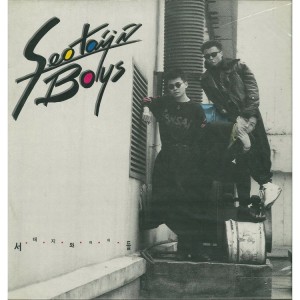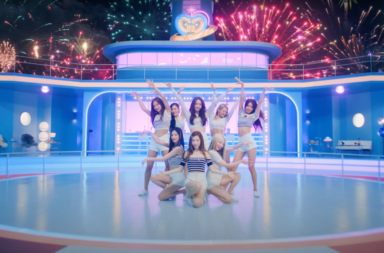 Another year has gone again and, as we look back on what songs have come out and what new groups appeared on the scene this year, I’d like to move our gaze farther back to those groups and songs that came before.
Another year has gone again and, as we look back on what songs have come out and what new groups appeared on the scene this year, I’d like to move our gaze farther back to those groups and songs that came before.
We had some great anniversaries this year, some of hit songs, some of big groups, like the celebration of Super Junior’s 10 years since debut, and we’re at an amazing point in the history of K-pop with the original founders mentoring the up and coming groups, and those groups beginning to come into their own to usher in amazing new things. So, without further ado, let me celebrate 20 years of K-pop and regale you with a story.
The point at which we say K-pop began was with the formation of the group Seo Taiji and Boys in 1992. Seo Taiji was a relative newcomer on the music scene, but had been in the long-time rock and heavy metal band Sinawe for a few years, and now wanted to try something brand new for Korea, which turned out to be a dance pop group. He met with Yang Hyun-suk (who we now know as Papa YG) to learn to dance and Yang introduced him to Lee Juno, who was a top dancer in Korea at the time. The three of them formed a group, with Seo Taiji as the lead singer and songwriter and Yang and Lee as backup vocals, dancers, and choreographers.
Their debut song “Nan Arayo” premiered on a talent show on April 11, 1992 and failed to make an impression on the jury. However the album took off in sales, held No.1 on the charts for months, and the Korean music industry would never be the same. K-pop had arrived!
With their intense dance moves, catchy sound, and bizarre costumes, it may be surprising that audiences caught on to the new music so quickly, but it’s no surprise to see what it turned into. Luckily there’s always been a big musical tradition in Korea and there were plenty of young dancers and singers who were ready to jump into this new crazy trend, and young teenage fans who were ready to support them.
1993 saw Seo Taiji and Boys’ second album with the impressive ear worm “Hayeoga”, and the debut of a new dance group Deux, composed of Lee Hyun-do and Kim Sung-jae with “Turn Around and Look Back at Me”. Though Deux had only a few years of promotion (member Kim Sung-jae sadly died in 1995), “Look Back at Me” has proven to become one of the most popular songs of modern idols – many groups have covered it, including a young G-Dragon and Taeyang, Infinite H in 2012, and in 2014 a vigorous collab of BTS and Boyfriend.
Two other groups debuted in 1994 and 1995 who are still very popular within the modern music industry. They are DJ Doc, composed of three former DJs, Jung Jae-yong, Kim Chang-ryeol, and Lee Ha-neul, and R.ef (also known as Rave Effect) – Lee Sung-wook, Park Chul-woo, and Sung Dae-hyun.
While DJ Doc’s first big hit, 1995’s “Murphy’s Law” was from their second album, R.ef hit the ground running with their debut songs “Farewell Formula” and “Heartbreak”. VIXX is another modern group that often shows their love for these classics. Their recent single “Love Equation” was a cover of “Farewell Formula”, and they also did a medley of DJ Doc’s 1996 hit “Summer Song” and Deux’s “Look Back at Me” just last year.
Seo Taiji and Boys came back in 1995 with their fourth album, which also turned out to be their last. “Come Back Home” was even weirder and more innovative and controversial than any of their previous works, and yet was still incredibly popular with their fans. Seo Taiji decided on his own to retire the group right after promoting their new album, and subsequently left Korea for the US. He started his solo career in 1998, but didn’t promote or perform until he returned to South Korea in 2000, and has been infamously reclusive and private throughout his career.
Still, he is looked up to reverently within the Korean music industry today, is often called “the President of Culture”, and continues to have an immensely popular musical career. Yang Hyun-suk, of course, went on to found YG Entertainment and has also become an incredible influence on K-pop as we know it today (Big Bang, anyone?).
As well as being a turning point in some careers, 1995 saw the tragic deaths of two promising young singers whose songs are still loved by many, including our modern idols. The first was the sudden death of Kim Sung-jae of Deux in November of that year, only a day after his solo debut stage. That solo song, “As I Told You” became something of a nostalgic classic and was also covered by VIXX in 2013 on Immortal Song 2.
The second tragedy of 1995 was the death of Seo Ji-won at the very end of the year, Jan. 1, 1996. Seo was a soloist who debuted in 1994 and committed suicide shortly after finishing the recording of his second album. He was only 19 years old. His second album was released posthumously and the title song “Gather My Tears” went straight to the #1 spot, held it for 3 weeks, and went on to become a legendary song. U-Kiss performed a cover of of it in 2010.
However, despite the early tragedies, the outlook of this new genre of K-pop was still generally optimistic. A new dance group, Turbo, originally aiming to compete with Deux, took up their mantle after Kim Sung-jae’s passing. Kim Jong-kook (now known as the Commander of Running Man), first paired with Kim Jung-nam, and later with Mikey (Jo Myung-ik), began creating hit after hit beginning with “My Childhood Dream” and “Black Cat”, very soon selling millions of albums and receiving awards on top of awards. Kim Jong-kook is often credited as being a Triple-Crown winner, in this case meaning winning all three of the end of the year award shows’ Daesangs, or Grand Awards, a feat only the legendary Cho Yong-pil has also acheived.
And that next year, in 1996, the first SM Entertainment boy band exploded onto the scene. I’m sure you know of whom I speak, but that’s a story for another day.
Fascinatingly, there were many babies born during these years who would grow up to become world-famous K-pop idols. It’s only been 20 years, but still most of the maknaes in the industry are younger than the entirety of K-pop, including even Taemin of Shinee. Of course, the number of idols who have grown up with K-pop will only become a larger and larger group, but we’re in an interesting tipping point right now were we’re seeing the first great rise of groups like BTS and Got7, who were all born after 1992 and have literally never known a world without K-pop on the scene. I wonder how that will help them change the genre.
Read our other posts in this series:
History of K-pop, 1996: The Creation of Idols
History of K-pop: 2005, the year of the soloists, the rise of Epik High, and the debuts of SS501 and Super Junior
History of K-pop: 2006, Emotional Ballads and High-Kicking Dancing
History of K-pop: 2015, Old Faces Return, and New Faces Make History
History of K-pop: Top Hits of 2016
[Youtube (1)(2)(3)(4)(5)(6)(7)(8)(9)(10)(11)(12), Billboard, K-popK-fans, Images via Korea Herald, SM Entertainment, YG Entertainment, JYP Entertainment, Big Hit Entertainment]


